Dickinson Students Flourish in Summer Internships
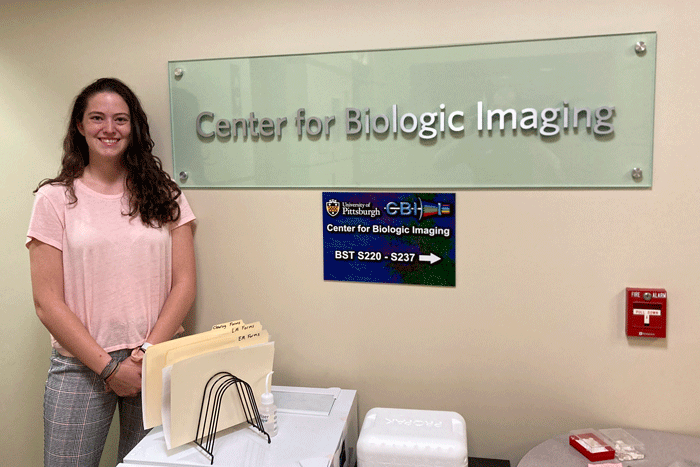
Jessie Scarlett at her University of Pittsburgh internship.
Across the country, and the globe, Dickinson students engaged in a wide variety of summer internships
by Tony Moore
At Dickinson, preparing for successful careers means going far beyond the classroom. Thanks to the college-wide efforts of faculty, staff and the Center for Advising, Internships & Lifelong Career Development, students regularly embark on research expeditions, service trips, global study, internships and a host of other opportunities. In fact, 93% of Dickinson students complete an internship, externship, research, service-learning or field experience before graduation.
Summer is often all about those internships. And this summer, Dickinsonians explored nearly 300 internships in medicine, finance, law, software engineering and a host of other fields across the country and across the world, taking that next step toward a career.
Below is a small sampling:

Jessie Scarlett ’22 at her University of Pittsburgh internship.
Jessie Scarlett ’22 (neuroscience) was a student researcher at the Center for Biologic Imaging at the University of Pittsburgh, where she worked in the lab processing 3D images of tissue taken with confocal microscopes. Specifically, she worked with mouse brains that were infected with viral encephalitis and cancerous human prostate tissue, learning how to use the microscopes, how to prepare tissues for imaging and writing potential sections for a research paper to be published in the fall or winter of 2021. She hopes to work as a research assistant after college and then apply to clinical psychology Ph.D. programs.
On what she learned:
“I have learned how to talk to people with more experience than me and learn from them. Additionally, applying my knowledge of neuroanatomy and chemistry from my classes at Dickinson to do research is a valuable experience to have as an undergrad.”
On how to land an internship:
“I had better luck reaching out to individual professors and asking if they needed help over the summer. Most of them do need help, and it’s an easy process for them to even pay for a summer researcher, especially if it is at a larger university. I would tell peers that it is okay if the experience does not exactly line up with your research interests or future interests. Experience is experience, and working in any type of a lab will help improve your skills in one way or another.”
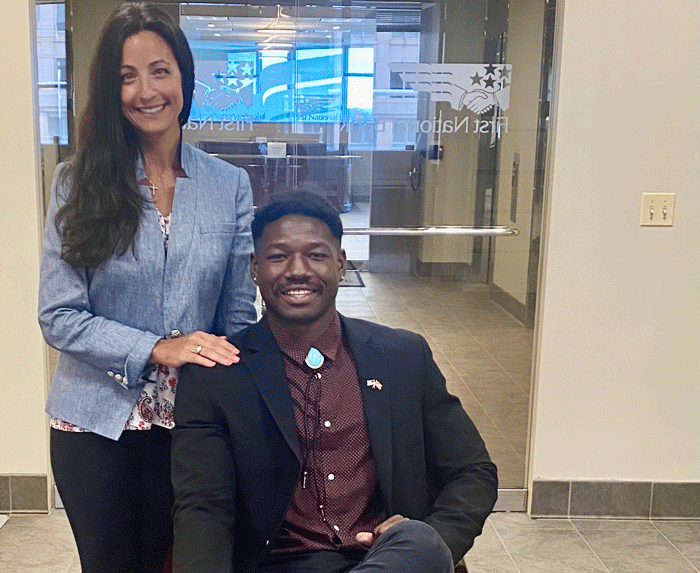
Zyon Jenkins ’22 at his First National Bank internship.
Zyon Jenkins ’22 (international business & management) was a business banking/wealth management intern at First National Bank, where he chiefly assisted with preparing loan documents for loans between $20,000 and $8,000,000. Now, citing the “many exciting positions you can have in a bank,” Jenkins is looking to pursue a career in wealth management after graduation.
On what he did on a daily basis:
"I helped my supervisor look for strengths and weaknesses in companies and try to figure out the kind of loan that is best suited for their plans. When I wasn’t prepping loan documents, I went on client calls to try to bring in new clients or maintain relationships. I also worked on a side project with the senior VP of my group to help the bank be more memorable."
On the most valuable part of this internship experience:
"In all of the economics classes that I’ve taken at Dickinson, we talk about the theories and ideas that encourage economic events. I feel like this internship has really put context to everything I've learned at Dickinson, so going into senior year, I think I'll be able to analyze problems better. I've also seen how a bank works from within, which has been really cool."
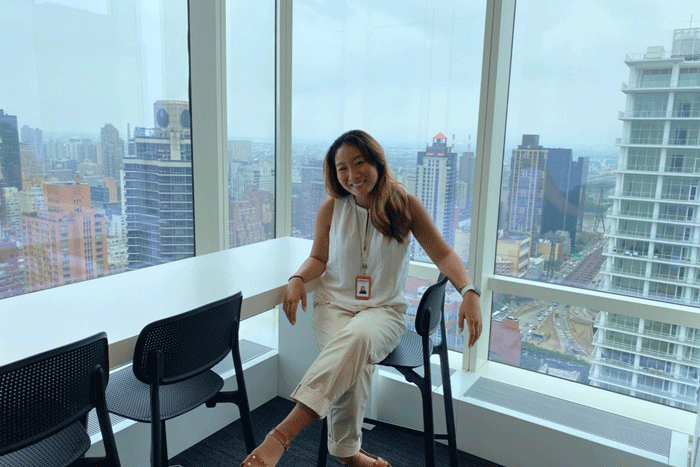
Himeno Yamane ’22 at her Bloomberg internship, high above New York City.
Himeno Yamane ’22 (international business & management) was a sales and analytics intern at Bloomberg LP, where she was trained with two teams, one in sales and one in analytics. Having previously interned at the Asia Society in the summer of 2020, she now sees herself finding a home at Bloomberg one day.
On the value of the internship:
“The most valuable part about this internship for me is that I was able to create relationships that I believe will last forever. Throughout conversations, I’m able to listen, ask questions and reflect on my own journey. These friendships have allowed me to see a different world that is much bigger than mine.”
On what to look for in an internship:
“I think the most important thing to look at when applying for internships are the company’s missions and values. It's important to recognize what direction your company is heading, how you imagine yourself impacting their plan in a positive way and how you can impact their company as a whole. It's valuable to apply to a company that believes in the same passions as you, because the more you and your company are similar, the more you will enjoy the time.”
On how the internship better prepared her for the future:
“Bloomberg has prepared me to overcome challenges and to learn and grow from mistakes. Rather than focusing on what you failed at or why you made that one specific mistake, they helped me recognize that I need to keep pushing and improving on different aspects of not just work, but life as a whole. As I prepare for the next chapter of my life, whether that be at Dickinson or after I graduate, I know that I will continuously reflect on, and take in, feedback from peers, as I know it’s the only way to make you become a better individual for others.”
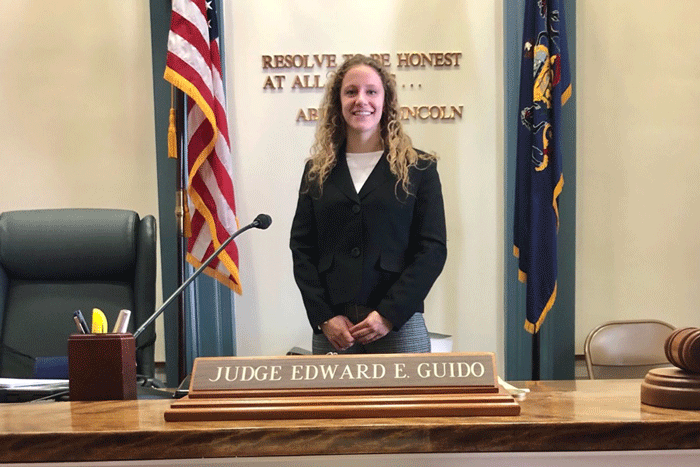
Hadley Starr ’22 at her Cumberland County Courthouse internship.
Hadley Starr ’22 (French & Francophone studies, international studies) was a judicial intern at the Cumberland County Courthouse under adviser Judge Edward Guido ’72, who teaches law & policy at Dickinson. After taking Judge Guido’s Negotiation and Advocacy class, Starr asked if he had any opportunities for her to intern for him. And as it turns out, he did. Now she’s eyeing law school after her Dickinson experience comes to an end.
On what she did and what she learned:
"I have the opportunity to go into the courtroom and watch pretrials, trials and other settlements. I took notes on the cases to analyze them and come up with questions. I then reviewed the cases with the judge after. We were able to discuss the laws and precedents, and the judge was able to answer any of the questions I have. The most valuable part has been taking the information that I learned in my Negotiation and Advocacy class this past semester and seeing how attorneys actually use those skills in the courtroom. Being able to see different judges use and apply the law has been an invaluable experience."
On the advice she’d offer to other students considering an internship:
"My advice is to form connections with professors and faculty at Dickinson! I’ve gotten all three of my internships through professors and faculty at Dickinson. There are so many resources and opportunities through Dickinson, and sometimes all it takes is sending one email asking for guidance or advice!"
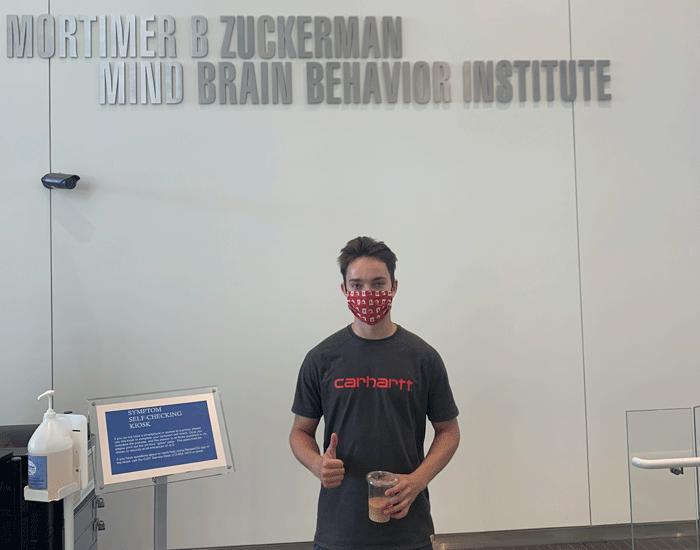
Philip Mollerus ’23 at his Columbia University internship.
Philip Mollerus ’23, (computer science) was a lab software engineer at the Zuckerman Institute at Columbia University, where he planned and devised structure for experiments, developed programming structure for experiments, wrote and tested code, worked on debugging, collected data from test participants, interpreted data, and wrote code for data analysis. Now he hopes to enter the software engineering industry or go to graduate school to continue his education in the fields of computer science, math or data science.
On the most valuable part of this internship experience:
"The most valuable part of my internship was gaining experience in devising program structure on my own, problem solving and developing my critical thinking and troubleshooting skills. We spent the majority of our time debugging software that we created, so I spent a great deal of time thinking deeply about how my code functions, its pitfalls and how I can work around any issues/bugs that may arise."
Advice he’d offer to other students considering an internship:
"Become comfortable not knowing how to do certain things. That is how you learn. Become comfortable teaching yourself how to overcome hurdles in these situations (using internet resources or coworkers for help, for example). But also, don’t hesitate to ask for help from your supervisor if you’re really stuck."
On how his internship better prepared him for the future:
"This internship trained me to become a better critical thinker, to become more patient with myself and to be much more organized/uniform with how I plan and problem solve."
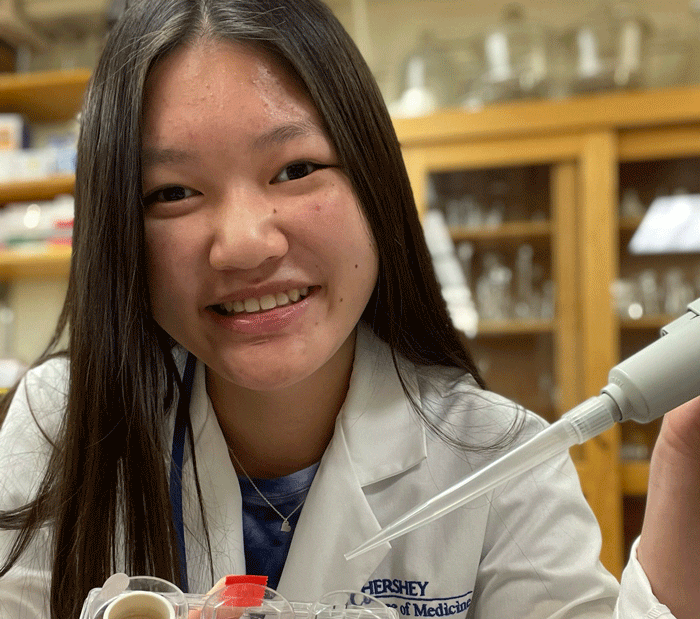
Stephanie Uroda ’23 at her Penn State College of Medicine internship.
Stephanie Uroda ’23 (chemistry, neuroscience) was a research assistant at Browning and Travagli Laboratory, in the Department of Neural and Behavioral Sciences at the Penn State College of Medicine. Finding the spring-summer-fall internship through a referral by Jessica Hampton ’17, after Zooming with several Dickinsonians looking to help current students, Uroda focused on researching the sex differences in stress adaptation, specifically how estrogen affects oxytocin levels in the hypothalamus and brain stem.
On how the internship was valuable:
"The most valuable part of this internship experience was simply being in a lab and getting the opportunity to apply the knowledge of neuroanatomy I learned in the classroom. Because of the pandemic and remote learning, my time in the classroom lab was very limited. This internship has allowed me to learn and become more confident in my laboratory skills due to the level of independence and responsibility this opportunity and my primary investigators (PI) provided."
On the advice she’d offer to other students considering an internship:
"Networking is so important for building your career, and it is always great getting to meet new people. Take every chance you can to talk to your professors, alumni and peers about your goals and their own experiences. You never know when a great opportunity is just a conversation away!"
On how her internship better prepared her for the future:
"This internship has given me a glimpse into the life of a full-time researcher, a career path I have been considering for a long time. I have gotten the opportunity to speak with the other scientists and graduate students in my lab about their experiences. These conversations have allowed me to picture myself in their shoes and reaffirmed my aspirations to continue neuroscience research after completing my undergraduate degree. After graduating from Dickinson, I plan to take a year or two to work in a research laboratory to continue exploring my interests and learn more laboratory techniques, and then I will pursue a Ph.D. in neuroscience."
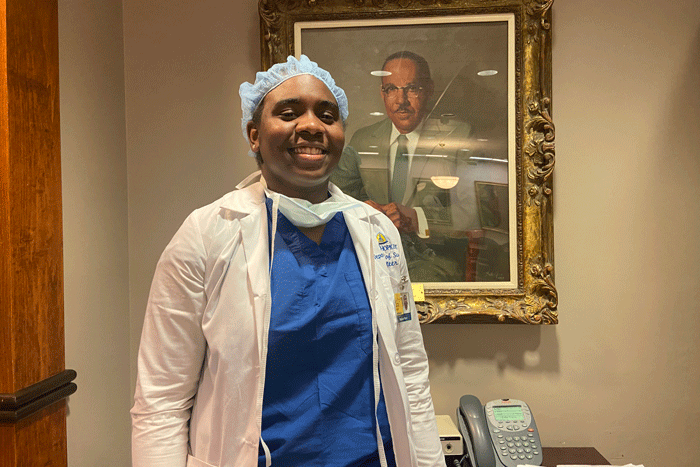
Daisheau Player ’22 at her Johns Hopkins internship.
Daisheau Player ’22 (chemistry) was an intern at the Johns Hopkins Department of Surgery, where she undertook a shadow experience in a variety of surgical departments. After having previous internships at Hopkins in different departments, Player now looks to medical school as her postgraduate destination.
On what she did on a day-to-day basis:
"I usually arrived between 5:30 and 6:30 a.m. and did rounds with the residents and medical students in whichever department I was assigned. I then attended a case conference, where the residents go back over the treatment plan for all of the patients currently on their service. After this, I either shadowed the attending during their rounds or shadowed in the OR. Sometimes, I shadowed PAs or nurses outside of the OR to learn about their responsibilities to the patient. I also attended clinic appointments and pre-op appointments."
On what was the most valuable part of the internship experience:
"My internship allowed me to make connections with doctors, students and residents, who provided tons of advice on the next steps of my journey. I also learned about time management, managing expectations and the doctor-patient relationship. It has positioned me to better articulate why I plan to pursue medicine."
Advice she’d offer to other students considering an internship:
"You should absolutely pursue internships. You’re guaranteed to learn something from the experience, even if you learn that you don’t like what you were doing."
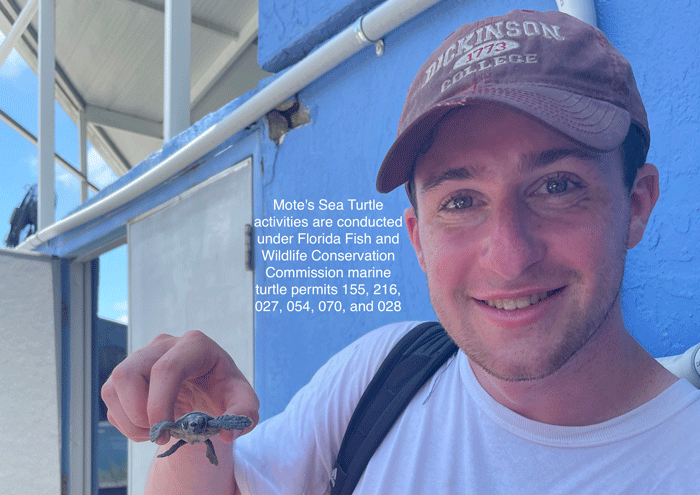
Theo Benson Bufferd ’22 at his Mote Marine Laboratories Aquarium internship.
Theo Benson Bufferd ’22 (environmental science) was a sea turtle conservation and research intern at Mote Marine Laboratories and Aquarium in Florida this summer, following two previous internships in 2020—one at the Ocean Mammal Institute in Hawaii and another at the Flatiron Grass Fed Farms in Colorado. The future marine biologist wants to perform research and do conservation work after getting his master’s and Ph.D.
On what he did on a day-to-day basis:
"Five days a week, I wake up at 5:30 or 6 a.m. and drive to my assigned key. Once there I wait for volunteers’ voicemails to come into voicemail system. Volunteers walk the beach starting at civil twilight looking for new sea turtle activities (false crawls/nests) and existing sea turtle nest activities (depredations, hatches, overwashes, etc.). Depending on the amount of activities, I could be on the beach anywhere from two to six hours. If I get to a crawl and it's a nest, I fill out a data sheet for it as well as verifying the nest, meaning digging down to find the first egg and take other measurements as well. As we get later into the season, we also perform excavations on these monitored nests which allows us to record the contents of each nest. Sometimes we find live hatchlings and release them at sunset later that night."
What is the most valuable part of this internship experience for you?
"The ability to go out into the field and perform fieldwork to help protect an endangered species."
What advice would you offer to peers considering an internship?
"Do what makes you happy and explore different internship opportunities because who knows, you might end up doing something like this for your job one day."
How has this internship better prepared you for the next year at or life after Dickinson?
"I improved my skills of paying attention to detail and learned how to work through intense fatigue on the beach."
TAKE THE NEXT STEPS
Published September 2, 2021